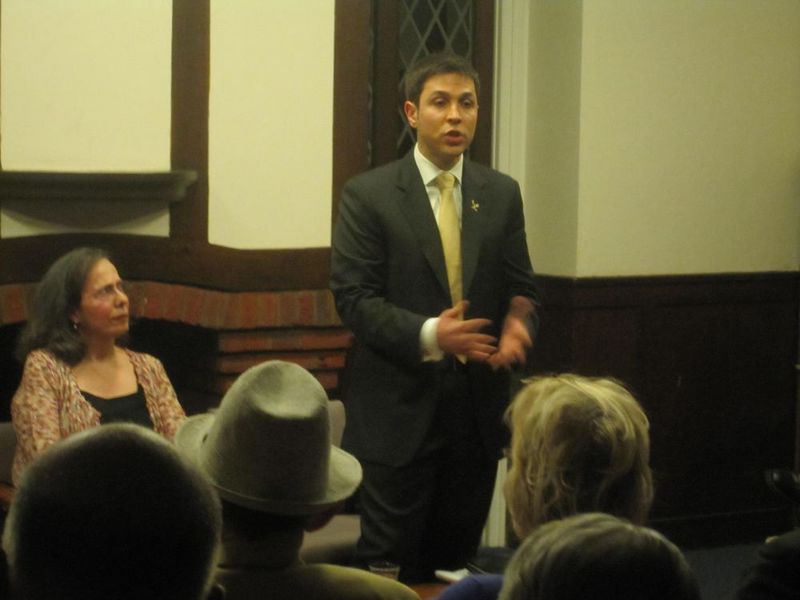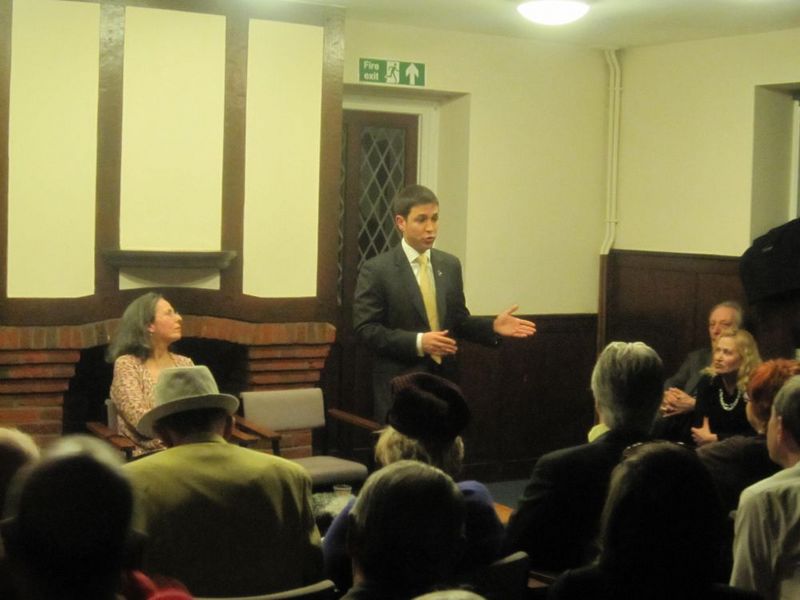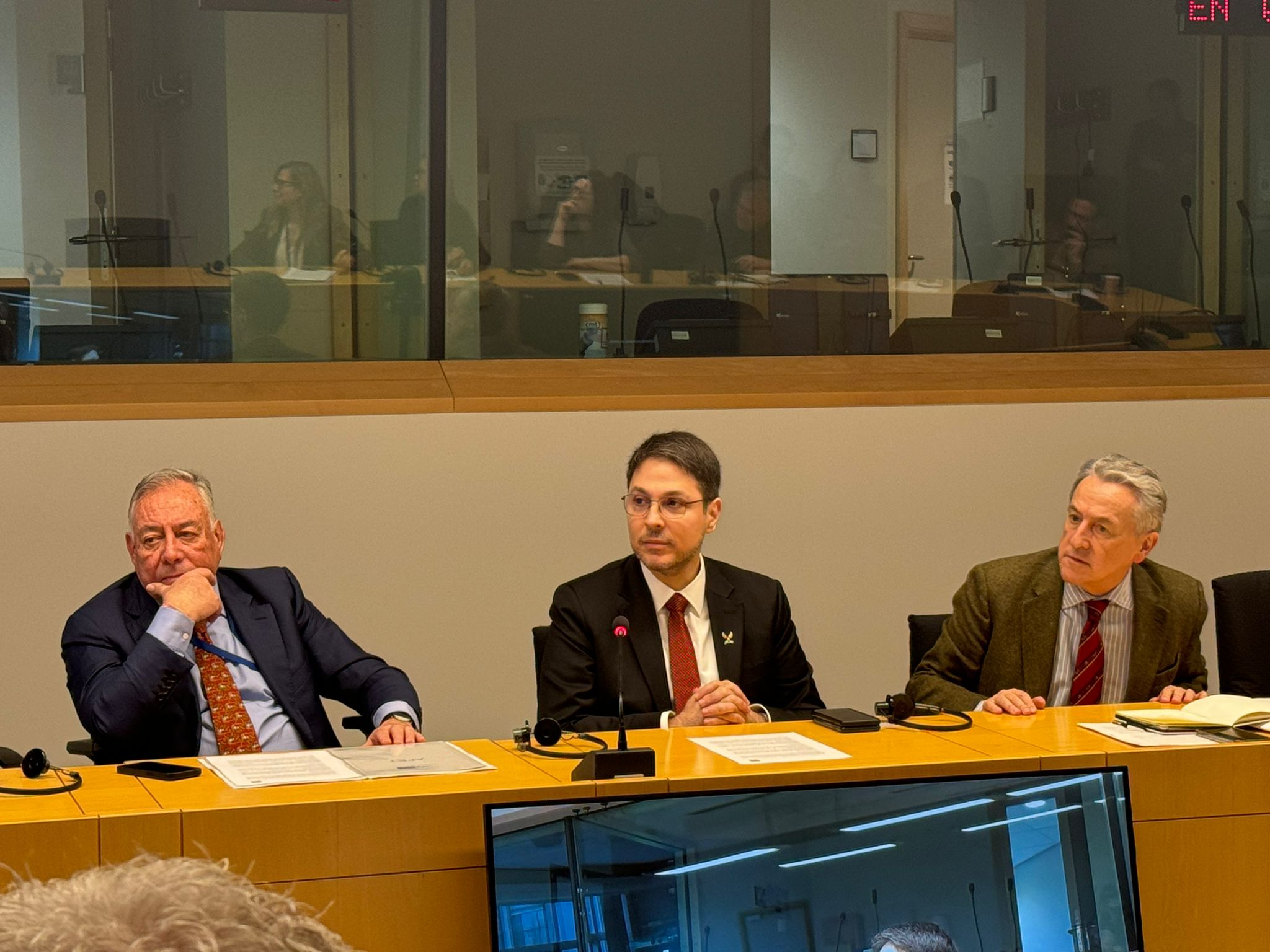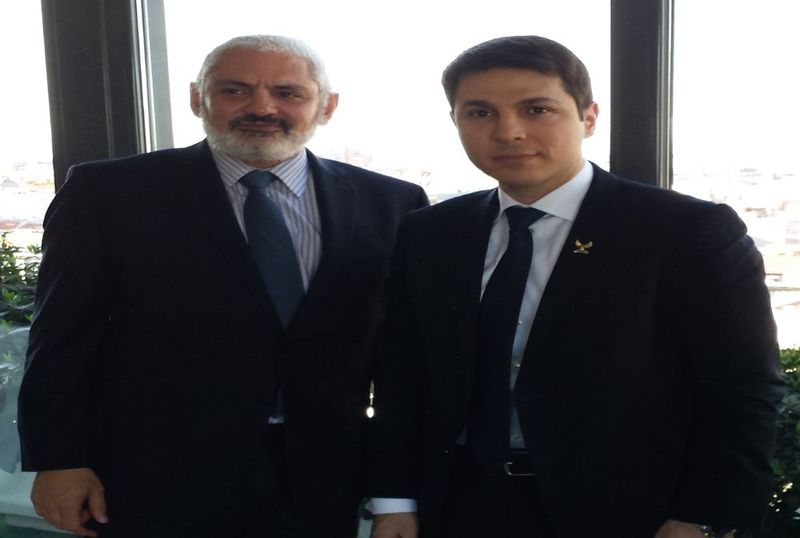Ribal Al-Assad, the Director of the ODFS, this week called for a peaceful inclusive democratic transition in Syria in a speech to the International Forum, Hampstead, London. The packed audience included professionals, business people, analysts and journalists. The talk was well received and concluded with a comprehensive Q & A Session.
Ribal Al-Assad made the following speech:
Good evening …
… and thank you for that kind introduction.
I should start by addressing the issue of my surname.
You will all be aware that being called ‘Al Assad’ is not currently the best way to win friends and influence people!
Particularly when you are related to the Syrian President.
I am sure you will be relieved to hear that is where the similarities end …
… as our politics have as little in common as our shopping habits.
As you can imagine, my name can be a hindrance.
Particularly in this country.
But it has also afforded me an unparalleled insight into events in Syria and the Middle East.
And it still opens doors for me to give what I hope will be a more balanced and objective view of events in my country than you may have read elsewhere.
I currently live in exile in London.
This is also a mixed blessing.
I miss the country I love.
But being here leaves me free to criticise the Syrian regime without fear …
… and to champion democratic reform.
It also gives me a sense of perspective.
Because I closely follow events at Westminster …
… and give or take a few pence in taxation …
… I see the major political parties here increasingly pushing into a relatively narrow, moderate middle ground.
Which cannot be said for the Arab world.
Where vested interests are stretching political doctrines to the extremes …
… by trying to frame in the whole conflict on sectarian lines and thereby fueling sectarian conflict.
Having experienced both environments …
… I know which is healthier …
… and which is more likely to lead to unimaginable grief and suffering.
Which is why my agenda is not as simple as the overthrow of a corrupt regime …
… or to condone the knee-jerk reaction to its violence – which tends to be support for the loudest and most extreme element of its opposition.
My focus is democracy and pluralism.
Because I genuinely believe that they offer the last and only hope for a peaceful future for my country …
… and those around it.
And when I say ‘democracy’ …
… I mean ‘real’ and ‘genuine’ democracy.
Elections in which all parties are allowed to participate.
And not the sort that simply pay lip-service to pluralism.
That is, of course, all we can expect from the Syrian regime’s recent promises of elections …
… which are token gestures …
… aimed at appeasing the United Nations.
I welcome Kofi Annan’s six point plan and it’s acceptance by the regime
Of course the regime should now show through actions that it is implementing it
because its past promises have not been delivered
Also the Syrian opposition should show through actions that they support the peace plan
I will return to this later.
Other than the recent distraction of the Presidential family’s email inbox …
… the Western press understandably focuses on the terror perpetrated by the regime.
And understandably so.
The shelling of civilians …
… the shooting of protesters …
… and the persecution of religious groups …
… is obscene.
But its danger …
… is that if we only read about the violence …
… we may jump towards the wrong solution by supporting the wrong people
This approach would be fatal to the chances of peace.
And it is something that cannot be understood simply by looking within Syria’s borders …
… because it requires an understanding of global international relations.
And when it comes to global politics …
… we need to start with the Superpowers.
Because we are witnessing the early stages of a new Cold War …
… facing Russia and China …
… against the United States and NATO.
It is evidenced in what China perceives to be a US policy of encirclement …
… and in Chinese currency protectionism …
… and in President Medvedev’s warning on Friday that time is running out for the West to secure Russia’s agreement to a missile defense shield in Europe.
These issues continue to bubble …
… and as with the Cold War of the last century …
… these superpowers hone in on the world’s trouble spots …
… to fight their proxy battles.
And it will surprise none of you, that when it comes to trouble spots …
… there is nowhere quite like the Middle East and North Africa.
For many decades, the Arab Israeli conflict has been at the heart of regional politics …
… but the nuclear stand-off with Iran notwithstanding …
… the most volatile issue right now …
… is the cross-border sectarian divide between Shiaas and Sunnis across the Arab World.
This divide did not cause the Arab Spring.
But it has been fundamental in ensuring the metamorphosis of the Spring’s initial optimism …
… into chaos.
The popular protests across Egypt, Libya and Tunisia …
… shared the common outcome of a deposed dictator …
… but also the hijacking of the moderate and peaceful majority who sparked change …
… by more sinister and extreme forces.
As a result, Islamists have entered the fold …
… backed by insidious elements in Saudi Arabia and Qatar …
… and rather than free and transparent elections …
… we are witnessing nothing short of bedlam.
It is a lesson that should have been learned from the toppling of Saddam Hussein…
… namely that it is one thing to displace a dictator …
… but another to bring about a more stable and democratic replacement.
But if there is a country in the Middle East where this should be possible …
… it is a Syria.
Our people represent a mosaic of ethnicity …
… and 45% of the population are classified as ‘minorities’.
Thirty years ago …
… ours was a progressive society …
… with an admirable record on women’s rights and cultural acceptance.
But no more.
Syria now sits in the middle of a tug-of-war …
… with two extremes supported and funded by vested interests …
… pulling it apart.
And those interests are Iran on one side, supported by Russia and China …
… against Turkey, Saudi Arabia and Qatar on the other …
… with the implicit backing of the United States.
To maintain its strategic interests, Iran has spread its tentacles far and wide in Syria, Iraq and Lebanon
The survival of the regime in Damascus is in Tehran’s interest …
And so Iran will do everything in their power to …
support to the Syrian regime
This attempt to manipulate the Shiaa Arabs support to develop Iranian Imperial objectives …
… is happening in parallel with Turkish Imperial manipulation of Sunni Arabs support .
Turkey is the growing player in the region …
… economically and politically …
… and it has gathered a host of regional allies who share its enmity to Iran.
This includes Saudi Arabia and Qatar …
… two influential power brokers in the in the Arab League …
… who are both breeding Islamic fundamentalism.
In line with its aim of widening the sectarian divide …
… Saudi has described as ‘excellent’ the idea of arming Syria’s rebels.
Qatar also has a recent history of empowering extreme Islamism in Libya and Egypt.
This is ‘real politic’ in action.
Saudi and Qatar have frosty relations historically …
… but have come together to pursue a common cause .
… irrespective of the Regional consequences of arming elements of the oppositions on sectarian line.
The region is bubbling towards something apocalyptic.
State-sponsored television channels such as Safa and Wisal preach extremism…
… whilst clerics in Mosques openly call for Jihad against the Shiaas and Alawites.
So as things stand, we are not just on the brink of a civil war …
… but a regional war played out on Syrian soil …
… overseen and influenced by the world’s Superpowers.
There are parallels with events in 1980s Lebanon …
… when refugees, arms, and religiously inspired fighters crossed Middle Eastern borders…
… as they did after the start of the Iraq war in 2003.
The consequences will soon be felt across the Region..
And as the petrodollars and arms for jihadists flood-in …
… Syria has the key elements to turn into a great-power proxy battleground on the scale of Afghanistan.
Which brings me to the crux of the Syrian problem:
That this tide of sectarian conflict …
… needs to be calmed-down by the opposition …
… not stirred.
But one part of the Syrian opposition, the SNC
which is still a non-representative movement …
… has helped transform the actions of moderate protestors seeking democratic reforms and chanting “Peaceful, Peaceful, Peaceful” …
… and “One, one, one, the Syrian people are one”….
… into a violent hub of extremism.
Last week, the New York-based advocacy group Human Rights Watch …
… reported that armed opposition groups in Syria have kidnapped, tortured and executed members of the security forces and supporters of the Syrian regime.
This is abhorrent …
… as it demonstrates that the opposition is no more democratic or moderate than the regime.
And they leave Syria’s minorities and all secular people more fearful that the regime may be replaced by something worse
Indeed this is why the two largest cities Damascus and Aleppo have not risen against the regime
The SNC has admitted that it is largely made-up of Islamists.
Al-Bayanuni …
… the former leader of the Muslim Brotherhood …
… explained publicly that the relatively liberal Burhan Ghalioun was chosen to lead it, and I quote:
“to prevent the regime from capitalizing on the presence of an Islamist at the top of the Syrian National Council. This man, he is different from us with respect to political thought and ideas”.
The SNC’s ideas have moved dramatically in recent months.
Initially it promoted non-violent struggle …
… but it now has a military council to coordinate the violent overthrow of the regime.
Initially it claimed to work for a democratic Syria …
… but it is funded by patently un-democratic regimes.
Its duplicity knows no boundaries …
… and it is no surprise that twenty of its most influential members recently broke away to form the Syrian Patriotic Group.
And yet the West continues to offer its support.
Hillary Clinton has recognised the SNC as a legitimate representative of peaceful Syrians …
… despite warnings from U.S. Director of National Intelligence James Clapper …
… who described the opposition as fractured, “not a national movement” …
… and infiltrated by al Qaeda.
As a result, the ‘Friends of Syria’ conference in Tunis failed …
… not least because many peaceful opposition groups including our own …
… were not invited.
Which was not for want of trying.
We wrote to the organisers via the Embassy and the advisors to the President and Foreign Minister …
… but received no reply, so we sent a delegation to Tunis …
…that was banned from even approaching the conference site.
So for the follow-up meeting in Turkey we have written to the Turkish government via its former Foreign Minister …
… but in reply – just more silence.
This is yet more evidence that there is no attempt to unite the opposition …
… unless you share the extremist outlook of the SNC.
It is vital that the West understands this issue.
The SNC is violent and unrepresentative.
It is backed by Islamist groups and states from around the region.
They, in turn, are benefitting from the US and Nato’s policy of benign neglect in Syria …
… where responsibility is left with Turkey …
… despite its own partisan agenda.
I do not doubt the West’s sincerity when it calls for an end to Syria’s problems.
As I said earlier I welcome the regime’s acceptance of Kofi Annan’s Six point plan “to bring an end to all violence and human rights violations, secure humanitarian access and facilitate a Syrian-led political transition to a democratic, plural political system.”
But I can guarantee that this will not happen under the auspices of the SNC.
As democrats, we are entitled to ask why it was chosen.
Why it rose to prominence.
From where it found its legitimacy?
And how democratic was that process?
I have described how the tide of violence is surging …
… and how it is generating its own momentum.
In this contest, War is inevitable.
But I am launching a three point plan to maximise the chances of a peaceful future.
It is simple and brief:
Firstly the opposition must act in a way that is inclusive and representative of the Syrian people …
… by creating a platform where all parties can come together and speak with a single voice.
Secondly, it must work peacefully with the international community with the aim of non-violent regime change…
…even if this process involves speaking to the incumbent Regime.
Thirdly, and only once it can display real unity …
… can it take on the regime by campaigning for a genuinely pluralistic election.
No amount of heavy shelling can destroy moderate, democratic thinking.
No amount of terrorism can undermine a unified and peaceful majority.
President Obama and Prime Minister Cameron explained in Washington that Syria doesn’t need a revolution from below …
… but a transition from above.
I agree.
But it will require enormous reserves of patience, resilience and diplomacy to make it happen.
I would be delighted to answer your questions.
Thank you.




